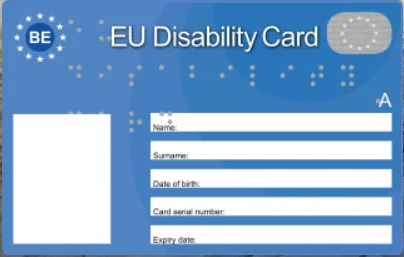Brussels – Another step toward the creation of a European disability card: Today (Jan. 11) the European Parliament’s Committee on Employment and Social Affairs has unanimously green-lighted the proposed law that will harmonize disability recognition across the EU.
The bill, presented by the European Commission last 6 September, will now go before the plenary session of the European Parliament, as early as next week in Strasbourg, the last step before the start of interinstitutional trialogues with the member states, which have already made their position. This time the EU has burnt the stages, to enable the 87 million European citizens with some form of disability—about one-fifth of the population of the 27 EU countries—to enjoy at last real access to the right to free movement. “We are well on our way to finalizing the new law in a few months, which shows our willingness to act on behalf of people with disabilities who have waited many years for this legislation,” cheered the rapporteur for the European Parliament, Lucia Ďuriš Nicholsonova, of the liberals from Renew Europe.
The proposal does not put its hand on the parameters by which each member state grants its national cards (which remains the exclusive competence of each country), but wants to ensure that when a person is deemed disabled in his or her home country, they can benefit from treatments and facilities reserved for people with disabilities under the laws of the other states in the bloc.

In practice, the directive introduces a Disability Card valid throughout the EU and renews the European parking card for people with disabilities. The two cards will ensure that, when travelling abroad, people with disabilities have access to the same special conditions as those who reside in that member state, including access to parking, since for those living with disability “private car transportation often remains the best or only option for independent travel and movement.”
Today, it is too often the case that disability status is not recognized abroad, resulting in people not being able to access special conditions and preferential treatment in public and private services and not benefiting from reduced rates or personal assistance while staying in other member states. This was the finding of the public consultation that the European Commission launched from February to May 2023, in which 70 per cent of respondents said that the lack of mutual recognition of disability status in the EU “results in different treatment for nonresident persons with disabilities.”
The MEPs proposed that the two cards be available free of charge in physical and digital formats, and also accessible in national and international sign languages and Braille. According to the European Parliament, member states and the European Commission should make sure to raise awareness about the European disability and parking cards for people with disabilities, including creating a website with information on how to obtain, use, and renew the cards throughout the EU.
“Great satisfaction” from Elena Lizzi, MEP for the Lega, shadow rapporteur of the proposal. “A tool like the Disability Card will be able to provide certainty and remove administrative barriers both for people with disabilities and for public and private operators of services, facilities, and activities,” Lizzi explained, hoping that the final negotiations “will proceed swiftly and we can get the directive approved before the end of the legislative term.”




